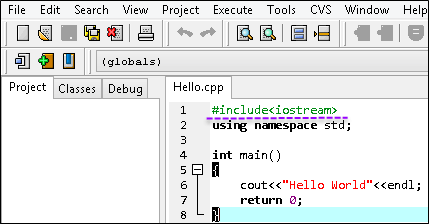Dev C++ Hello World Example
C/C++ support for Visual Studio Code is provided by a Microsoft C/C++ extension to enable cross-platform C and C++ development on Windows, Linux, and macOS.
In this example, we will learn to create a simple program named 'Hello World' in C programming. A 'Hello, World!' Is a simple program that outputs Hello, World! On the screen. To create your C hello world program, create a new project: 1. Open Visual Studio and go to File-New-Project Choose a project template. In VS, the project template for C and C is the same. Select Visual C. From the templates on the right, select “Win32 Console Application”.
Getting started
I was trying to do a simple Hello world in C in Dev-C but it keeps on get a error. Here's is the code i used Code: #include int main. To compile and run simple console applications such as those used as examples in these tutorials it is enough with opening the file with Dev-C and hit F11. As an example, try: File - New - Source File (or Ctrl. File dev-job c devmain2014 job xport spool reports. How 'Hello, World!' Program works? The #include is a preprocessor command that tells the compiler to include the contents of stdio.h (standard input and output) file in the program. The stdio.h file contains functions such as scanf and printf to take input and display output respectively. Apr 16, 2020 Dev-C This IDE, written in Delphi is the right place for beginners. It isn't perfect and it allows you 'holes' and 'bugs' in your program.Thats why its good for beginners. As is the case with most modern scripting languages, getting a Hello World sample running is really easy. How to Run the Solution Instead of running the commands directly within the console though, the best route is to write your scripts in a file and call the file when necessary.
C/C++ compiler and debugger
The C/C++ extension does not include a C++ compiler or debugger. You will need to install these tools or use those already installed on your computer.
Popular C++ compilers are:
- GCC on Linux
- GCC via Mingw-w64 on Windows
- Microsoft C++ compiler on Windows
- Clang for XCode on macOS
Make sure your compiler executable is in your platform path so the extension can find it. You can check availability of your C++ tools by opening the Integrated Terminal (⌃` (Windows, Linux Ctrl+`)) in VS Code and try running the executable (for example g++ --help).
Install the Microsoft C/C++ extension
- Open VS Code.
- Click the Extensions view icon on the Sidebar (⇧⌘X (Windows, Linux Ctrl+Shift+X)).
- Search for
c++. - Click Install.
Hello World tutorials
Get started with C++ and VS Code with Hello World tutorials for your environment:

Documentation
You can find more documentation on using the Microsoft C/C++ extension under the C++ section, where you'll find topics on:
Dev C++
Remote Development
VS Code and the C++ extension support Remote Development allowing you to work over SSH on a remote machine or VM, inside a Docker container, or in the Windows Subsystem for Linux (WSL).
To install support for Remote Development:
C++ Hello World Gcc
- Install the VS Code Remote Development Extension Pack.
- If the remote source files are hosted in WSL, use the Remote - WSL extension.
- If you are connecting to a remote machine with SSH, use the Remote - SSH extension.
- If the remote source files are hosted in a container (for example, Docker), use the Remote - Containers extension.
Feedback

Java Hello World
If you run into any issues or have suggestions for the Microsoft C/C++ extension, please file issues and suggestions on GitHub. /mokafix-audio-vst-download.html. If you haven't already provided feedback, please take this quick survey to help shape this extension for your needs.